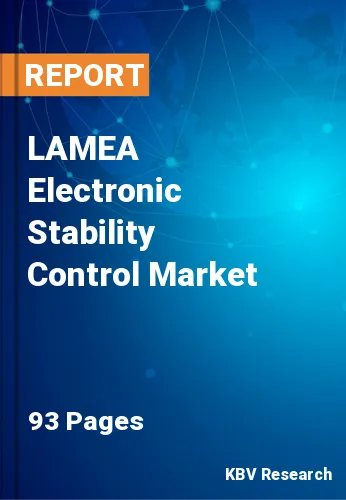The Latin America, Middle East and Africa Electronic Stability Control Market would witness market growth of 10.2% CAGR during the forecast period (2022-2028).
Electronic stability control systems greatly enhance vehicle control and stability. To help the driver maintain control of the car during sudden movements, the systems use computer control for separate wheel brakes. This is accomplished by keeping the automobile pointed in the direction the driver is steering, even when the car approaches or hits the limits of road traction. So, ESC would significantly improve road safety, thereby increasing the system's demands and propelling market growth.
Depending on whether the 4WD system is engaged, certain cars' ESC systems may automatically determine whether to function in off-road or on-road mode. When the vehicle is in 4WD High-range with the center differential locked or 4WD Low-range with the center differential closed, it immediately engages off-road traction control and disables ABS braking. When low-range or specific terrain modes are manually selected, most modern vehicles with completely electronically controlled 4WD systems automatically transition to an off-road-oriented mode of stability and traction control.
The Roads and Transport Authority (RTA) has exempted electric cars licensed in Dubai from public parking. On September 1, 2017, DEWA introduced the incentive of free charging for all EV users signed up for the DEWA EV Green Charger Project. For all non-commercial EV users who registered for the program, an incentive extension was introduced on January 1, 2020. The National Industrial Development Center (NIDC) wants to draw three to four original equipment manufacturers from throughout the ICE and EV value chain to meet the Kingdom's vision 2030 objective of producing 300,000 vehicles yearly with 40% local content by 2030. By offering loans, tax breaks, and tariff exemptions, NIDC encourages industrialization. These factors are driving the market growth in the region.
The Brazil market dominated the LAMEA Electronic Stability Control Market by Country in 2021, and would continue to be a dominant market till 2028; thereby, achieving a market value of $248.2 Million by 2028. The Argentina market is experiencing a CAGR of 10.8% during (2022 - 2028). Additionally, The UAE market would display a CAGR of 9.9% during (2022 - 2028).
Based on Component, the market is segmented into Hydraulic Unit, Sensors and Electronic Control Unit. Based on Vehicle Propulsion, the market is segmented into ICE and Electric & Hybrid. Based on Vehicle Type, the market is segmented into Passenger cars, Light Commercial Vehicles and Heavy Commercial Vehicles. Based on countries, the market is segmented into Brazil, Argentina, UAE, Saudi Arabia, South Africa, Nigeria, and Rest of LAMEA.
Free Valuable Insights: The Worldwide Electronic Stability Control Market is Projected to reach USD 13.6 Billion by 2028, at a CAGR of 8%
The market research report covers the analysis of key stake holders of the market. Key companies profiled in the report include Robert Bosch GmbH, Continental AG, Johnson Electric Holdings Limited, Aisin Corporation (Toyota Motor Corporation), Valeo SA, Murata Manufacturing Co., Ltd., Hitachi, Ltd., Knorr-Bremse AG, ZF Friedrichshafen AG (TRW), and Mando Corporation (Halla Group).
By Component
By Vehicle Propulsion
By Vehicle Type
By Country
Our team of dedicated experts can provide you with attractive expansion opportunities for your business.

